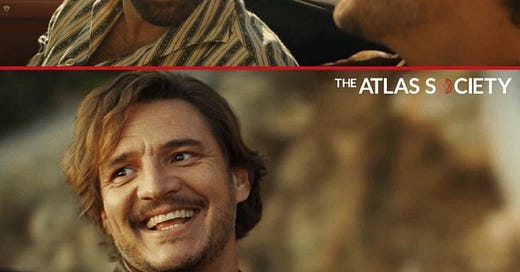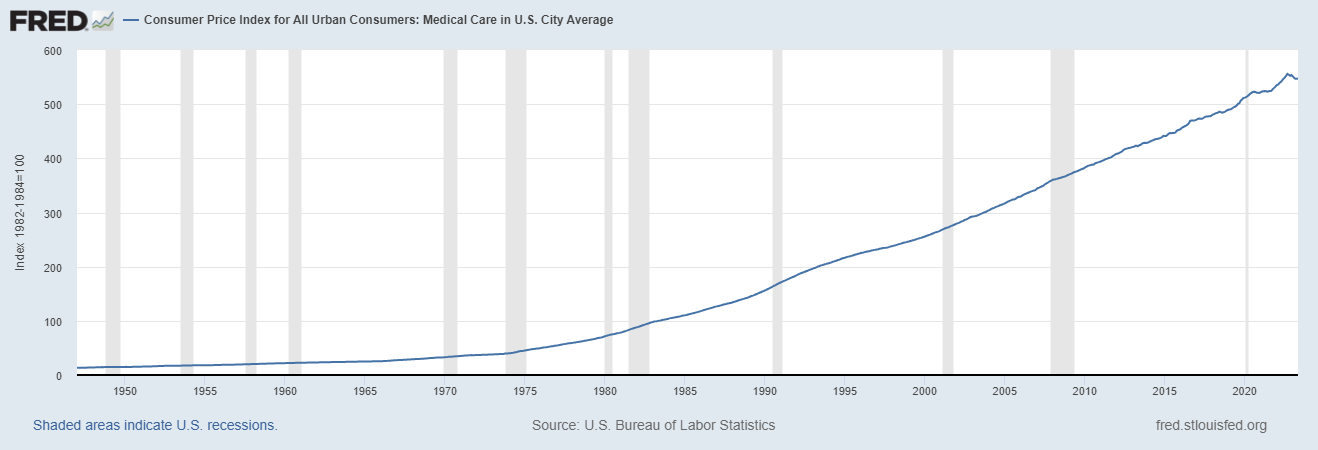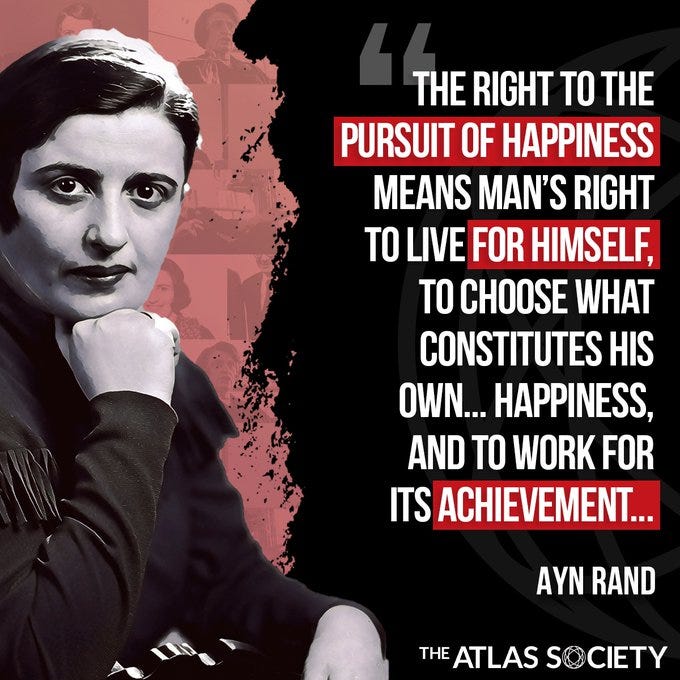I recently finished Atlas Shrugged by Ayn Rand. It was a long read (over 1,000 pages with tiny print), but I really enjoyed the story which had a bit of everything in it. The long speeches by the main characters were difficult to get through at times, but there was one speech in particular that is iconic to me (and I think also to the Bitcoin community), the most relevant part of which I have included below:
Do you wish to know whether that day is coming? Watch money. Money is the barometer of a society’s virtue. When you see that trading is done, not by consent, but by compulsion - when you see that in order to produce, you need to obtain permission from men who produce nothing - when you see that money is flowing to those who deal, not in goods, but in favors - when you see that men get richer by graft and by pull than by work, and your laws don’t protect you against them, but protect them against you - when you see corruption being rewarded and honesty becoming a self-sacrifice - you may know that your society is doomed. Money is so noble a medium that it does not compete with guns and it does not make terms with brutality. It will not permit a country to survive as half-property, half loot.
It struck me that this passage hits a lot of things we are seeing in society and government today, especially our failing fiat currency system and related effects. For this week’s post, I thought I would look at ten lessons we can learn from Atlas Shrugged, with specific examples of their application to the present-day world political, economic, and social situation and also how we can relate these lessons to Bitcoin.
Here they are:
Individualism and Self-Interest: Ayn Rand’s philosophy focuses on the importance of the individual and acting in self-interest, while allowing others to pursue the same: “I swear by my life and my love of it that I will never live for the sake of another man, nor ask another man to live for mine.” In today's world, the lesson of individualism and self-interest reminds us to value personal freedoms and the pursuit of one's own goals. This lesson can be seen in movements advocating for individual rights, such as privacy rights (freedom technology such as Bitcoin, Lightning Network and Nostr), freedom of expression (pushing back against social media censorship and supporting independent news media), and the right to engage in voluntary transactions (pushing back against Central Bank Digital Currencies and opting out of inflationary fiat currency).
Dangers of Excessive Regulation: The lesson from Atlas Shrugged about the adverse consequences of excessive regulation is pertinent to today's world. Excessive government regulation can stifle innovation and hinder economic growth. Examples include the challenges faced by emerging technologies like Bitcoin where regulatory uncertainties and barriers can slow development and adoption. Also many long-established industries such as energy have been over-regulated historically, reducing supply and driving up prices - most recently with the US government’s actions to shut down oil pipelines and curtail exploration. This clearly led to higher oil prices and contributed to recent inflation. Out of all the states, one needs to look no further than California for a lesson in over-regulation which drives out businesses and citizens.
Free Market Capitalism: Rand's promotion of free market capitalism reminds us of the benefits of a market-driven economy, competition, and entrepreneurship. Today, this lesson encourages us to appreciate the role of the free market in driving economic growth, fostering innovation, and creating opportunities for individuals and businesses. Unfortunately, with so much government regulation and involvement in industry today, we really don’t have a true free market system. That begins with the Federal Reserve setting arguably the most important price in the world (the price of money - interest rates) to massive government spending on favored initiatives (i.e., The Inflation Reduction Act of 2022 and The CHIPS and Science Act are just two recent examples).
Value of Productive Contributors: Atlas Shrugged emphasizes the importance of recognizing and valuing productive contributors to society. In today's world, this lesson can be seen in efforts to reward and incentivize innovation, entrepreneurship, and scientific advancements. However, these are often in elite/government-favored areas such as “climate change,” “ESG,” and other irrational popular narratives. At the same time, government regulation and taxation provide a major dis-incentive to productive members of society. The best incentive would be to have less government regulation and taxes (smaller government) and more freedom.
Limited Government Intervention: Rand's criticism of excessive government intervention resonates with contemporary debates surrounding the scope and extent of government powers. Discussions on issues such as surveillance, privacy, and censorship highlight the importance of limiting government control. Just a few examples of “too much government” today include:
Regulatory Burden: Excessive regulations can stifle economic growth and innovation. Industries such as banking, healthcare, and energy face complex and burdensome regulations, impeding competition and hindering market efficiency. As mentioned previously, California is a textbook example of this.
Taxation: U.S. tax system has become overly complex and burdensome, leading to high compliance costs for individuals and businesses. High corporate tax rates can discourage investment and economic expansion. The government has recently expanded IRS funding in order to more aggressively enforce tax laws against “tax cheats.” Wouldn’t it be better to reduce and simplify taxes so there is less incentive to cheat the system? When you add up all the taxes (income, property, sales, etc.) some parts of the country can easily approach 50% of your wages! Again, California is a good example of this.
Healthcare: Programs like the Affordable Care Act (ACA), which I was never a fan of, have led to increased regulation, higher costs, and limited choice. A more market-oriented approach could promote competition, lower costs, and expand access.
Education: Federal involvement in education, through initiatives such as the Common Core State Standards and standardized testing requirements, represents excessive government intrusion into local decision-making. There should be more local control and parental choice in education. Indeed, my view of home schooling has changed over the past few years to be much more favorable, as I have seen how the quality of the government run elementary educational system has deteriorated. The popular narrative of socialism in colleges appears to have reached the point where you dare not offer an opposing opinion, for fear of cancellation / failing. This was not my experience when I went to college and is totally unacceptable.
Surveillance and Privacy: Concerns about excessive government surveillance have been raised, particularly in the aftermath of revelations about mass data collection by intelligence agencies. Such surveillance infringes upon individual privacy rights and exceeds the necessary limits for national security and there are sadly many recent examples. Just last week, French lawmakers passed a bill allowing police to remotely activate cameras on citizens’ phones. We also have the recent example of the Canadian Trucker Protest, where individuals who supported the movement had their bank accounts frozen. More recently a politician in Great Britain was allegedly de-banked for his political views.
Importance of Reason and Rationality: Atlas Shrugged highlights the significance of reason and rational thinking in decision-making and problem-solving. Some people call this “critical thinking.” In today's world, this lesson encourages us to base policy decisions and social interactions on logical reasoning and evidence, particularly in areas like climate change, public health, and technological advancements. Unfortunately, there is a lot of hysteria around climate change and misunderstanding of “facts” and “science” that makes a rational discourse difficult. Indeed, the notion that the government can control the weather and is somehow best situated to solve climate issues is ridiculous. Similarly, “public health” is another area where we have learned many lessons over the past few years about “facts” and “science” being used to coerce the population in ways that take away personal freedom and liberty, including freedom to travel or even the ability to go to work. This is also unacceptable.
Ethics of Trade and Property Rights: Rand's emphasis on the ethics of trade and property rights finds relevance in today's discussions on fair trade, intellectual property, and wealth distribution. It reminds us of the importance of respecting private property rights and engaging in voluntary trade. Wealth inequality can be traced back to fiat money printing and the Cantillon Effect, rather than the actions of individuals attempting to be productive in society. Indeed, we should be able to retain the fruits of our labors without having to deal with taxation / inflation / debasement of the money, which when you think about it in the Austrian Economics sense are violations of property rights, if not actual theft.
Intellectual Property Rights: Atlas Shrugged indirectly addresses the concept of intellectual property rights by highlighting the value of ideas, the innovations they inspire and the importance of freedom to unleash them. Today businesses focus is on protecting intellectual property (principally “walled gardens” of Big Tech companies). The future of creativity and innovation is open source software, which has the advantages of affordability, flexibility, strong values, collaboration, transparency and high security. Examples include Python, Linux, Mozilla Firefox, Wordpress, PHP and BitTorrent to name just a few.
Value of Hard Work and Achievement: Rand extols the virtues of hard work, productivity, and achievement. In today's world, this lesson encourages a culture that recognizes and rewards individual effort and merit. Unfortunately, too many people expect government handouts (stimulus checks, student loan forgiveness) or gravitate toward “easy money” like gambling on stock options, any number of TikTok influencer “get rich quick” schemes, or blowing their money in shitcoin casinos. We need to return to traditional values of working hard to earn a living and saving in a way that doesn’t diminish in value over time and doesn’t require you to risk your money at the Wall Street casino.
Individual Liberty and Personal Responsibility: Atlas Shrugged champions individual liberty and personal responsibility as fundamental principles. In today's world, this lesson reminds us to safeguard personal freedoms and take responsibility for our actions. This is perhaps the most important lesson of all. We should take personal responsibility for our lives, our actions and making sure that we are doing all the right things for ourselves and our loved ones to lead free, happy, healthy and productive lives.
How This Relates to Bitcoin
At its core, Bitcoin offers several key features that differentiate it from traditional financial systems. These features include:
Absolute Scarcity. With a maximum supply of 21 million coins, Bitcoin embodies scarcity, much like gold - only better. This scarcity ensures that Bitcoin cannot be devalued or diluted, providing a hedge against fiat currency debasement.
Peer-to-Peer Transfers. Bitcoin enables seamless and secure peer-to-peer transactions worldwide. Whether you're sending value to your neighbor or someone on the other side of the globe, all you need is a computer and an internet connection.
Independence from Legacy Systems. Unlike traditional financial infrastructure, the Bitcoin network operates independently. It serves as the first global digital payments infrastructure, free from the control of any person or group.
Trustlessness and Security. Bitcoin's decentralized and immutable ledger, coupled with its "proof of work" consensus mechanism, ensures that the system remains trustworthy and immune to manipulation. This integrity is lacking in our current financial system.
Simplicity and Accessibility. Bitcoin's digital nature simplifies the validation, storage, transfer, and security of assets. Unlike gold, it doesn't face the same challenges when handling large amounts, making it more accessible to everyone.
Bitcoin, as a decentralized digital currency built on blockchain technology, aligns with several of the lessons from Atlas Shrugged. It embodies the principles of individualism, limited government intervention, free market capitalism, property rights, and perhaps most importantly personal responsibility. Bitcoin offers individuals the ability to control their wealth, engage in voluntary transactions, and operate outside of traditional financial systems. By providing an alternative to centralized monetary authorities, Bitcoin challenges the status quo and promotes a more decentralized, individualistic approach to finance in line with the lessons from Atlas Shrugged.
Not financial or legal advice, for entertainment only, do your own homework. I hope you find this post useful as you chart your personal financial course and Build a Bitcoin Fortress in 2023. To see all my books on investing and leadership, click here.
Always remember: freedom, health and positivity!
Please also check out my Building a Financial Fortress Podcast on YouTube here and on all your favorite streaming platforms. I do a weekly Bitcoin news update every week on current items of interest to the Bitcoin community, usually 30 to 60 minutes depending on the number of topics to cover. Please check it out if you haven’t already. Also now on Fountain, where you can earn Bitcoin just for listening to your favorite podcasts.
If you’re looking for more great Bitcoin signal, check out friend of the show Pleb Underground here.
Lightning tips appreciated here:








No joke. We are living so many of the great books. Animal Farm, 1984, Brave New World, Atlas Shrugged.
Bitcoin is as close to Galts Gulch as we are going to get. For now at least.